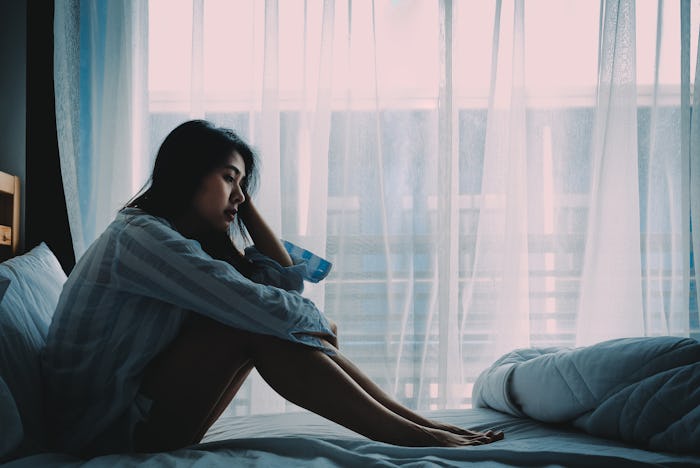Life
Young People Are The Loneliest Generation In The US, Study Finds, & Here’s Why
Although you may often hear about how important it is to keep older generations engaged and to make sure older adults aren't lonely and isolated, as it turns out, younger people may actually be lonelier, at least in the United States. Young people are the loneliest generation in the U.S., according to a new study, which is a bit surprising considering they are more "connected" to others than ever before thanks to cell phones and social media. Researchers have some theories as to why young people in the U.S. are so lonely, but there might be many reasons.
A nationwide survey by health insurer Cigna found that almost 50 percent of respondents said that they felt alone or left out "always or sometimes," according to NPR. Using the UCLA Loneliness Scale, Cigna surveyed 20,000 adults online across the U.S. for the report. If a respondent ended up between 20 and 80 on the UCLA scale, they were considered lonely. The higher the number, the greater the threat of loneliness.
The survey found that 46 percent of Americans reported always feeling alone, while 27 percent rarely or never feel that anyone truly understands them, according to Forbes. And 20 percent reported that they "rarely or never feel close" to others, which is definitely an upsetting statistic.
The most surprising part of the study may be the results that showed just how prevalent loneliness is among young people. On the 20-to-80 scale, overall national loneliness was high at 44, but young people who are part of Generation Z showed even higher scores — about a 48 on the scale, according to USA Today. That's compared to a score of almost 39 for the Greatest Generation (people 72 and older as defined by NPR).
And millennials aren't much better. They scored a 45.3, which is still higher than the already distressing national average. Baby Boomers, by comparison, scored lower than the average national loneliness score at 42.4. Julianne Holt-Lunstad, a psychologist at Brigham Young University who studies loneliness and its effects on health, told NPR of the findings:
Too often people think that this [problem] is specific to older adults. This report helps with the recognition that this can affect those at younger ages.
But why do young people seem to be lonelier than other generations? Researchers have some ideas, and other recent reports can give us more insight into the problem of loneliness.
There is some scientific evidence that social media use is bad for your psychological health, Psychology Today reported in January. Since millennials and people in the generation behind them have had social media for so much of their lives, it would make sense that it has an influence on their loneliness and overall mental health. But it's more complicated than that.
The Cigna survey actually didn't find a correlation between the use of social media and feelings of loneliness, NPR reported. Holt-Lunstad told the outlet that previous research shows that how people use social media determines its influence on them. If you're passively using it, she explained, it can have negative effects. But using it for connection, or even to set up more interactions in the "real world" can be a good thing.
In fact, young people with the highest rates of social media use in the survey had similar feelings of loneliness compared to people who barely use it at all, USA Today reported. So that doesn't seem to be the best place to point the finger.
Having a good "balance" on all aspects of your life, including your work-life balance, seems to have an impact on your loneliness, according to the Cigna survey. And yes, even young people need to work on that balance. People in the survey who said they work "just the right amount" were the least likely to be lonely, Cigna reported. Getting enough sleep and exercise and balancing the time you spend with friends versus family seemed to be important as well.
Other recent reports have revealed that young people struggle with other negative feelings too — for instance, millennials are less optimistic than baby boomers when it comes to their economic prospects, according to a recent MarketWatch piece. The reasoning behind that came down to very high student loan debt and high housing prices, for the most part.
Socializing face-to-face definitely made an impact in the Cigna survey, NPR reported. Respondents who reported more in-person social interactions on a regular basis also reported feeling less lonely.
It could be that young people with these intense feelings of loneliness aren't interacting with friends, family, and co-workers in person enough. It's also important for everyone, including millennials and members of Gen Z, to get enough sleep and exercise.
And if you're really struggling with feelings of isolation and loneliness, there are many hotlines that can help you cope. If you're feeling alone or having thoughts of suicide, call the Suicide Prevention Services Crisis Hotline, at 800-784-2433. If you or someone you know are in immediate danger, call 911.
For long-term care, the very best thing you can do is talk to a mental health professional in person, so if you have that option, definitely consider it and know that there's no shame in asking for help.
